The Automation Scenarios: Predicting the Impact
Automation Scenarios
The Automation Scenarios: Predicting the Impact
Automation Scenarios: Rapid, Moderate, and Slow Adoption
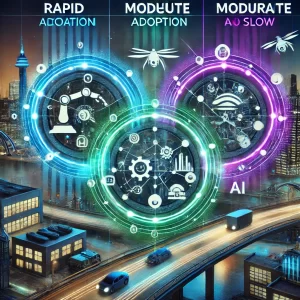 Automation is upon us. It has been for some time. And the pace of advance will only accelerate from here on. This holds seismic implications for the global workforce. Whether automation happens quickly or gradually, businesses and workers need to adapt. To understand the potential impact, we’ll look at three key scenarios: rapid, moderate, and slow adoption.
Automation is upon us. It has been for some time. And the pace of advance will only accelerate from here on. This holds seismic implications for the global workforce. Whether automation happens quickly or gradually, businesses and workers need to adapt. To understand the potential impact, we’ll look at three key scenarios: rapid, moderate, and slow adoption.
A Look Back at Automation’s Evolution
Before diving into the scenarios, it’s important to consider how automation has evolved over time. As discussed in our previous blog, “The Dawn of Automation: A Historical Perspective”, technological advancements like the Industrial Revolution and AI have historically reshaped industries and jobs. Each era of automation has been marked by both disruption and opportunity, and the current age of AI-driven automation is no different.
Rapid Adoption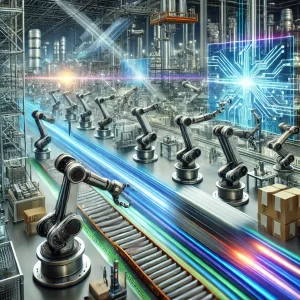
In the rapid adoption scenario, automation technologies—such as AI, robotics, and machine learning—are implemented swiftly across industries. Businesses prioritize these technologies for cost savings, efficiency, and staying ahead of competitors. As a result, 40-50% of jobs in sectors like manufacturing, transportation, and customer service could be automated by 2035.
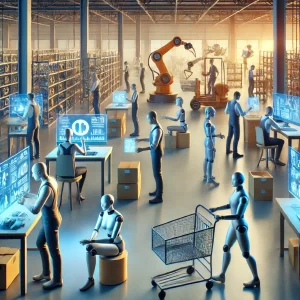 Moderate Adoption
Moderate Adoption
Moderate adoption sees businesses taking a more measured approach to automation, balancing the costs and benefits. This pace would still result in the automation of 20-30% of jobs in industries such as logistics, retail, and finance by 2040, allowing more time for workers to transition to new roles.
Slow Adoption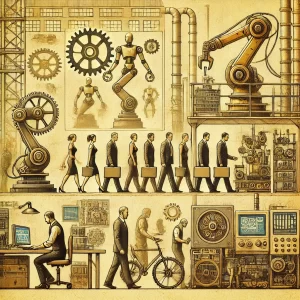
In this scenario, industries take a cautious, gradual approach to automation. Jobs in sectors like healthcare and education would be automated at a slower pace, with 10-15% of jobs potentially affected by 2050. This scenario provides more time for workers to reskill and transition.
Regardless of the pace, all of these scenarios have profound implications for the global workforce. The only question is, how rapidly will industries respond and adopt to automation?
Job Displacement Projections: The Numbers Behind the Change
Automation’s impact on job displacement varies widely depending on the scenario. The more aggressively businesses adopt automation, the more jobs will be replaced. Below, we’ll explore how many jobs could be displaced in each scenario, based on McKinsey’s projections.
Rapid Adoption
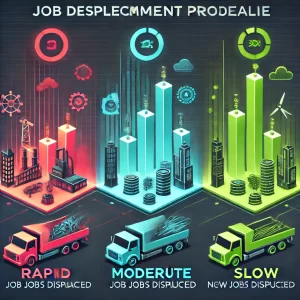 In the rapid adoption scenario, up to 800 million jobs worldwide could be displaced by 2035. Sectors like manufacturing, transportation, and logistics would be hardest hit, with automated systems taking over repetitive, manual tasks. For example:
In the rapid adoption scenario, up to 800 million jobs worldwide could be displaced by 2035. Sectors like manufacturing, transportation, and logistics would be hardest hit, with automated systems taking over repetitive, manual tasks. For example:
•Manufacturing: Up to 50% of factory jobs could be replaced by robotics and AI.
•Transportation: Autonomous vehicles could eliminate 30-40% of driving jobs.
•Retail: AI-driven customer service could displace up to 25% of retail jobs.
Moderate Adoption
In the moderate scenario, the rate of job displacement would be slower, with around 400-600 million jobs displaced by 2040. Industries like finance and healthcare would begin to adopt AI and automation, though the transition would be more gradual:
•Finance: AI-powered trading and data analysis could reduce roles in traditional banking, displacing 20-30% of jobs.
•Healthcare: AI could assist in diagnostics, reducing the need for 10-15% of radiologists and diagnostic technicians.
Slow Adoption
In the slow adoption scenario, the displacement of jobs would be less severe, affecting around 200-300 million jobs globally by 2050. The slower adoption would allow workers more time to transition, and the job losses would be less concentrated:
•Hospitality and Food Services: 10-15% of jobs could be automated, but slower adoption would soften the impact.
•Construction: Up to 15% of roles in construction could be replaced by AI-driven machinery, though this would occur gradually over several decades.
While these projections may seem daunting, they also highlight the opportunities for those willing to adapt and reskill. Automation will create new jobs, as well as reshape existing ones.
Potential Silver Linings: Job Creation in New Sectors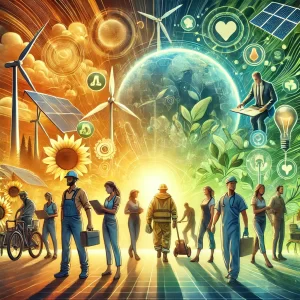
While job displacement is a significant concern, automation also presents opportunities for job creation. As new technologies emerge, industries will develop and expand, creating roles that previously didn’t exist. Below are some of the key sectors where job growth is expected to offset the effects of automation:
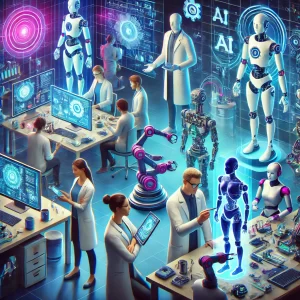 AI and Robotics Development
AI and Robotics Development
As businesses increasingly adopt automation, the demand for workers who can design, build, and maintain these systems will grow. Roles like AI specialists, robotics engineers, and data scientists will become essential. According to McKinsey, 10-15 million new jobs in AI development and maintenance could be created globally by 2030.
Green Energy and Sustainability
The shift towards renewable energy will also create millions of jobs in sectors like solar and wind energy. As discussed in our previous blog series on the Clean Disruption, the move toward sustainability will drive demand for jobs in green energy infrastructure, environmental engineering, and sustainability consulting. An estimated 30 million jobs could be created globally in the green energy sector by 2050.
 Healthcare and Social Work
Healthcare and Social Work
Despite automation’s ability to take over some routine tasks, sectors requiring human empathy, judgment, and interaction—such as healthcare and social work—will continue to grow. The demand for nurses, social workers, and therapists will increase, particularly as populations age. McKinsey projects that 50 million new healthcare jobs could be created by 2050, as technology aids rather than replaces healthcare professionals.
Creative and Strategic Roles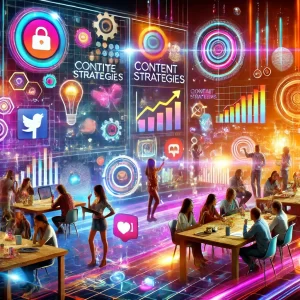
Jobs requiring creativity and strategic thinking—such as Internet marketing, content creation, and entrepreneurship—are less susceptible to automation. These fields are likely to flourish, as AI handles repetitive tasks, allowing humans to focus on creative, high-level work. As mentioned in our previous blogs, personal digital marketing businesses will thrive in this environment, offering a critical pathway to financial independence.
Preparing for the Future
The future of work will be shaped by how quickly industries adopt automation technologies. While job displacement is inevitable, there are significant opportunities for job creation and growth in emerging sectors. By focusing on reskilling, adapting to new roles, and embracing industries like AI development, green energy, healthcare, and Internet marketing workers can prepare to thrive in the changing workforce.
It’s time to get ready for the future of work. Explore more about how you can prepare by enrolling in our course Mastering the Art of Wealth Creation: A Journey Through Mind Power and Marketing, where you’ll learn how to harness digital marketing and network marketing to succeed in the age of automation.
Automation: Opening the Door to Greater Human Potential
 While automation may seem like the harbinger of endless work disruption, it also opens the door to a grander human experience—one where we are freed from the routine and given the opportunity to explore the depths of our existence. Imagine a future where, thanks to AI, humanity is able to step back from repetitive tasks and instead engage in pursuits that truly expand the mind and soul.
While automation may seem like the harbinger of endless work disruption, it also opens the door to a grander human experience—one where we are freed from the routine and given the opportunity to explore the depths of our existence. Imagine a future where, thanks to AI, humanity is able to step back from repetitive tasks and instead engage in pursuits that truly expand the mind and soul.
Embracing Wisdom: Automation as a Path to Philosophy and Happiness
As Socrates declared, the ultimate purpose of life is the pursuit of wisdom. Automation allows us the luxury to embrace this timeless wisdom, giving us more time to contemplate life’s greatest mysteries—about ourselves, the universe, and our place within it. Socrates believed that true happiness lay in contemplating the divine and liberating the soul from the distractions of the physical world. And now, for the first time in history, technology may grant us the time to explore such profound ideas.
Unlocking the Power of Creative Thought for Wealth Creation
The ability to reflect and understand deeper truths doesn’t just lead to personal fulfillment—it’s also a critical component of success and wealth creation. As technology reshapes the world around us, there’s no better time to explore how to apply the power of focused, creative thinking to achieve your financial goals. For those looking to harness this potential, we recommend diving into our blog series on Wealth Creation Books and the Creative Thought Method.
This series distills the wisdom of timeless books into actionable strategies, showing how to align your thoughts, desires, and actions to attract wealth and success. By mastering the Creative Thought Method, you can use your mental energy to unlock unlimited potential—no matter how the landscape of work may change.
Explore our in-depth articles to learn more about how the principles of thought can transform not only your financial future but also your understanding of what true wealth really means. Start your journey here and discover the deeper connection between philosophy, thought, and wealth creation
Uplifting Humanity: A Future of Creativity and Connection
In this new era, we will be able to reflect deeply on the principles of life—whether they be God, the matter of our existence, or the very ideas that shape our reality. Freed from the mundane, we can uplift ourselves and others by focusing on creativity, wisdom, and understanding. Automation, far from eroding our humanity, will create space for us to rediscover what makes us uniquely human: our ability to think, create, and connect with the world on a deeper level.
We stand on the brink of a future where we can redefine success—not just in terms of what we do, but in terms of who we become. The path forward offers both the thrill of technological progress and the possibility of true philosophical fulfillment, as we balance the practical with the profound, elevating not just our work but our very existence.
#AutomationImpact, #FutureOfWork, #AIWorkforce, #JobCreation, #GreenEnergyJobs, #DigitalMarketingJobs, #WorkforceTransition

John Rogers is a former Wall Street portfolio manager and served as CEO of Premium Enterprises and President of The Colorado Tire Recycling Center. He transitioned to digital marketing, founding WealthCreationMastermind.com to empower home-based entrepreneurs with cutting-edge strategies. Creator of the “Mastering the Art of Wealth Creation” online course, John has driven significant growth in network marketing, achieving the Blue Diamond rank and earning the title of Univera Associate of the Year in 2015. His expertise in leveraging technology for financial success transforms how entrepreneurs achieve their business goals.